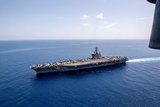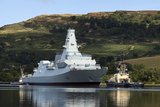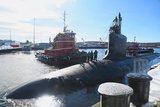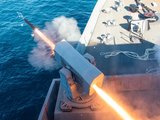DoD seeks support from University of Washington for naval R&D
The Applied Physics Laboratory (APL) at the University of Washington in Seattle, Washington is to conduct R&D, engineering and test and evaluation work for a range of US DoD programmes.
Under a $101.35 million indefinite-delivery/indefinite-quantity contract from Naval Sea Systems Command, APL will work on experimental oceanography; acoustic propagation (pictured); underwater instrumentation and equipment; marine corrosion; acoustic and related systems; simulations and signal processing; and ‘mission related and public service oriented research and development’, the DoD announced on 26 October.
The contract includes options which, if exercised, would bring its cumulative value to $218.82 million.
Work will be performed in Seattle, Washington, for completion by October 2025 (or October 2030 if all options are exercised).
As part of our promise to deliver comprehensive coverage to our Defence Insight and Premium News subscribers, our curated defence news content provides the latest industry updates, contract awards and programme milestones.
More from Naval Warfare
-
![US Navy to develop an undersea networking capability to support UUV operations]()
US Navy to develop an undersea networking capability to support UUV operations
The NEREUS project aims to enhance and expand the US Navy’s existing communications systems, enabling crewed/uncrewed seabed and subsurface missions.
-
![UK ‘Hybrid Navy’ steps up as Norway cooperation reinforces Arctic strategy]()
UK ‘Hybrid Navy’ steps up as Norway cooperation reinforces Arctic strategy
As Russia commits billions to new warships and stealth submarines, the UK is reshaping its strategy with expanded troop deployments, shared frigate fleets and a shift towards uncrewed platforms.
-
![How the Hedge Strategy will impact the US Navy’s future capabilities]()
How the Hedge Strategy will impact the US Navy’s future capabilities
The US Navy Hedge Strategy is intended to provide a lethal, modular and cost-effective fleet while accepting Washington’s fiscal and industrial constraints.
-
![US Navy and Raytheon explore additional applications for Mk 58 CRAW torpedo]()
US Navy and Raytheon explore additional applications for Mk 58 CRAW torpedo
Designed as an anti-torpedo and anti-submarine capability, the USN and RTX foresee the Compact Rapid Attack Weapon’s potential for deployment from surface ships and aerial and uncrewed platforms.
-
![RTX Raytheon targets nearly 170% RAM production increase to meet global demand]()
RTX Raytheon targets nearly 170% RAM production increase to meet global demand
The US multinational company is currently assembling 300 Rolling Airframe Missile rounds per year, with plans to reach 800 units annually after significant investment and modernisation of its facilities.





















